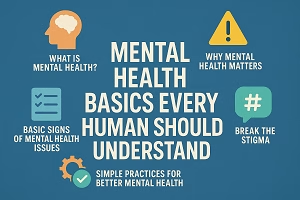Mental health is just as important as physical health—but often misunderstood or ignored. From dealing with stress to recognizing anxiety or depression, understanding the basics of psychological health is essential for living a balanced and meaningful life.
Whether you're a student, parent, professional, or elder, this guide will help you understand the core principles of mental well-being and why it matters more than ever.
🔍 What Is Mental Health?
Mental health refers to our emotional, psychological, and social well-being. It affects:
- How we think, feel, and behave
- How we handle stress
- How we relate to others and make decisions
Just like physical health, it can fluctuate—and that's normal.
⚠️ Why Mental Health Matters
Poor mental health can lead to:
- Stress, anxiety, or depression
- Trouble in relationships and work
- Physical issues like fatigue or sleep problems
Good mental health improves:
- Focus and productivity
- Emotional stability
- Quality of life and relationships
🔍 Basic Signs of Mental Issues
It’s important to recognize when something isn’t right. Common signs include:
- Constant sadness or irritability
- Feeling overwhelmed or anxious frequently
- Changes in sleep, eating, or energy
- Withdrawal from social activities
- Trouble concentrating or making decisions
🛠️ Simple Practices for Better Mental Health
You don’t need to be a psychologist to take care of your mental. Try:
- Regular exercise – Even 20 minutes a day helps
- Balanced diet – Food affects mood
- Sleep well – 7–8 hours of rest is a must
- Talk it out – Share feelings with trusted people
- Mindfulness/meditation – Just 5 minutes a day can reset your mind
🗣️ Break the Stigma
Mental illness is nothing to be ashamed of. It's time we treat mental health like any other issue—openly and compassionately. If someone seeks help, support them. If you’re struggling, reach out. Help is available.
🙌 When to Seek Professional Help
Don’t wait until things get worse. If symptoms last more than two weeks or interfere with daily life, it's time to:
- Talk to a counselor or therapist
- Call a mental health helpline
- Speak to a doctor for referrals
🧩 Conclusion
Health affects every area of our lives. Understanding its basics isn’t just for those in crisis—it’s for everyone. Let’s normalize mental health conversations, look out for each other, and build a world where emotional well-being is a priority for all.
Our Latest Posts
- Futuristic Tech You’ll Use Daily by 2025 (and After)
- Metaverse, Web 4.0, and AI Will Redefine 2025 and Beyond
- Trends For Entrepreneur Should Prepare For
- Next Gen Tech : What Will Technology Look Like in 2030?
- Tech Forecast: Game-Changing Trends and Predictions
- Tech for Tomorrow: Sustainability and Innovation Beyond 2025







